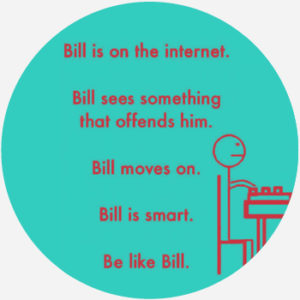rules of the internet
What does rules of the internet mean?
Rules of the internet refers to a humorous list of unofficial rules guiding online conduct or listing axioms about what the internet is and how users should behave on it.
Where does rules of the internet come from?

Contrary to what the name may imply, the so-called rules of the internet are not laws enforceable by any official authority. Rather, they are a series of in-jokes, guidelines, and references related to internet culture as it was in the early 2000s. Many of the catchphrases within the rules of the internet, as it exists today, are specific allusions to memes on 4chan or popular references to Fight Club, South Park, and so on.
Emerging as a kind of Netiquette for the Internet group Anonymous, the rules of the internet were published on the satirical wiki, Encyclopedia Dramatica, in 2006, before an attempt at a more official list emerged on 4chan in 2007. The founder of 4chan, Christopher Poole, has said that the rules became so popular that users tended to ignore 4chan’s rules in favor of their own homemade rules of the internet.
There’s no one, consistent, agreed-upon set of rules of the internet. The original list claimed, for instance, to have 50 rules, but actually only had 18. Some later versions have only 48 entries, whereas others have 100. While the rules vary quite a bit across online subcultures, a few have become well established, including a number of holdovers from the original Encyclopedia Dramatica:
Rule 1: Do not talk about rules 2-33
Rule 34: There is porn of it. No exceptions.
Rule 35: The exception to rule #34 is the citation of rule #34.
Rule 36: Anonymous does not forgive.
Rule 37: There are no girls on the internet.
Rule 38: A cat is fine too
Rule 39: One cat leads to another.
Rule 40: Another cat leads to zippocat.
Rule 41: Everything is someone’s sexual fetish.
Rule 42: It is delicious cake. You must eat it.
Rule 43: It is a delicious trap. You must hit it.
Rule 44: /b/ sucks today.
Rule 45: Cock goes in here.
Rule 46: They will not bring back Snacks.
Rule 47: You will never have sex.
Rule 48: ???
Rule 49: Profit.
Rule 50: You can not divide by zero.
Whatever the particular list, the rules of the internet are intended to be funny, and many rules purposely contradict each other. Rule 34, for example, refers to the ubiquity of pornography online: “There is porn of it. No exceptions.” Then, Rule 35 follows up: “The exception to rule #34 is the citation of rule #34.”
Other rules of the internet are misogynistic or provocative in nature. Rule 30 (in some versions), for instance, declares: “There are no girls on the internet.” as if to claim the internet as an exclusively male space. And Rule 31 demands: “Tits or GTFO,” or “Show me a picture of your tits or get the fuck out,” said to female users in online forums.
The early rules of the internet reflected the nature of 4chan at the time: raw, new, anonymous, and widely used by younger males with nerdy interests, like anime and gaming. As the internet expanded and evolved, the rules of internet evolved with it, leading some users to think the rules are dramatically out of date.
Examples of rules of the internet
“@tarastrong It is a frightening place, the internet. A lot of rules as well. The two I've come to know are Rule 34 and 63. Scary place.”
“On the internet, there are 48 rules; The Rules of the Internet.”
“As a constitution, the rules [of the internet] were always doomed to failure (Rule 15: "The harder you try the harder you will fail'). But they remain important as a document of online culture, created by 4chan's anonymous founding fathers.”
Who uses rules of the internet?
The rules of the internet were never intended to be actual law, so much as general guidelines, in-jokes, and clever axioms found amidst the internet community. Actually following the rules would be a joke unto itself, because, as Rule 15 says: “The harder you try, the harder you will fail.”
Some of the more popular and widespread memes have become memes of their own. Rule 34, as mentioned above, is a notable example, which has spawned entire websites all its own. Rule 63—“For every fictional character that exists, there is a counterpart of the opposite sex”—is also well known, though it was a later addition to the original rules. Another popular entry is Rule 32—“Pics or it didn’t happen”—which was also added later. While the rules of the internet are meant to be jokes, be mindful of the misogyny in some particular items.
NOTE
This is not meant to be a formal definition of rules of the internet like most terms we define on Dictionary.com, but is rather an informal word summary that hopefully touches upon the key aspects of the meaning and usage of rules of the internet that will help our users expand their word mastery.